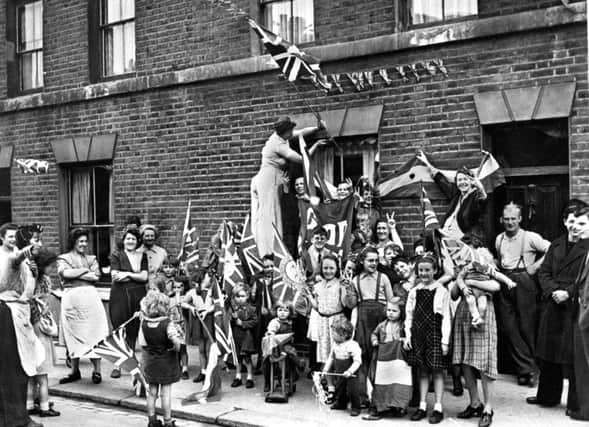Lisburn marked VE Day in style!


The German Chancellor, Adolf Hitler had taken his own life on the last day of April. His successor, Admiral Donitz authorised the military surrender of Germany which took place on 7th May 1945.
The British Prime Minister, Mr Winston Churchill declared the following day to be known as VE Day (Victory in Europe Day). A public holiday of two days was declared.
Advertisement
Hide AdAdvertisement
Hide AdLife in Lisburn was the same as in any other place in Northern Ireland. Among the advertisements in the weekly Lisburn Standard were the following: Girls Training Corps holding a parade and display; Wallace High School entry requirements; Welcome & Christian Workers’ Union Mission Sunday School and Lisburn Variety Theatre with its Saturday Night Show.
The Lisburn Standard was a weekly paper and the news relating to VE Day was written and published on Friday 11th May 1945.
The paper described the events from Monday 7th May - a radio broadcast warned the nation to ‘stand by’ for an important announcement to be broadcast at 4pm. The locals listened to their radio sets at home and at work but no announcement came.
The local Urban District Council meeting took place that night.
Advertisement
Hide AdAdvertisement
Hide AdAt 7.45pm, the meeting was disturbed by a telephone call to Mr T H McConnell the Town Clerk. The caller said that the Prime Minister, Mr Churchill would announce VE Day at 3pm the following day, Tuesday.
In addition, both Tuesday and Wednesday would be observed as general holidays. The local ARP (Air Raid Precautions) Officer, Mr R H Gibson soon broadcast the news over loud-speakers in Market Square, where it was then spread by pedestrians all over the town.
Although the official celebrations were to start the next day, the townspeople showed their relief and pleasure in no uncertain manner. At 3pm, Mr Churchill’s broadcast was relayed around Market Square to an attentive crowd who cheered when it was finished.
An open-air religious service was held after the King made his speech. Streets were packed and crowds paraded up and down until the wee hours of Tuesday morning.
Advertisement
Hide AdAdvertisement
Hide AdA squad of Belgian soldiers billeted in Lisburn marched to Dunmurry and then back to Knockmore, singing ‘Tipperary’ and other songs made popular in wartime. They lighted an impromptu bonfire in Seymour Street, brought out a melodion and danced for hours.
By the next day, the town had been plentifully decorated and looked really well. There were flags, bunting and decorations making the streets a riot of colour.
At night, fairy lights and the glow of bonfires added to the gaiety of the scene.
A few shop fronts were boarded up, but not many, with most shops displaying patriotic colours. Messrs J C Patterson’s premises in Bow Street and the Picture House looked well with their fairy lights. Once again the celebrations lasted into the wee small hours.
Advertisement
Hide AdAdvertisement
Hide AdAfter a break of a few hours, the celebrations continued into Wednesday evening. Parties were numerous and animated. In the streets, the people forgot their habitual reserve and sang, danced and made merry with one another as though they were all acquainted.
Bonfires burned. Effigies of Adolf Hitler were burnt with zest. Gramophone records were relayed over improvised loud-speaker systems.
Wednesday was more subdued, until the night came. By then, most folk were thoroughly tired out.